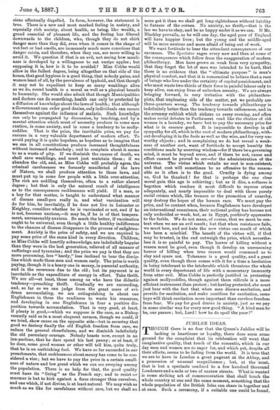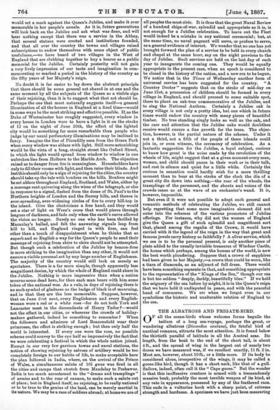JUBILEE IDEAS.
THOUGH there is no fear that the Queen's Jubilee will be lacking in heartiness or loyalty, there does seem some ground for the complaint that its celebration will want that imaginative quality, that touch of the romantic, which in our day men and women are so eager for, and which yet, despite all their efforts, seems to be fading from the world. It is true that we are to have in London a great pageant at the Abbey, and a procession of unusual magnificence ; but, at the moat, that is but a spectacle confined to a few hundred thousand Londoners and a mile or two of narrow streets. What is wanted is some striking act of commemoration that shall touch the whole country at one and the same moment, something that the whole population of the British Isles can share in together and at once. Such a ceremony, if a suitable one could be found, would set a mark against the Queen's Jubilee, and make it ever memorable in her people's annals. As it is, future generations will look back on the Jubilee and ask what was done, and will hear nothing except that there was a service in the Abbey, that several statues were erected and institutions founded, and that all over the country the towns and villages raised subscriptions to endow themselves with some object of public usefulness,—we have heard of two villages in the West of England that are clubbing together to buy a hearse as a public memorial for the Jubilee. Certainly posterity will not gain a very lively impression of our taste and imagination in com- memorating so marked a period in the history of the country as the fifty years of her Majesty's reign.
No doubt it is far easier to lay down the abstract principle that there should be some general act shared in at one and the same moment by all the subjects of the Queen as a visible sign of their rejoicing, than it is to suggest what that act should be. Perhaps the one that most naturally suggests itself—a general illumination of all the houses in England at a fixed time—would in some ways be the most striking and effective possible. If, as the Duke of Westminster has roughly suggested, every window in every house in London were to have a light in it on the stroke of 12 on the night of June 20th, the effect of the lighted city would be something far more remarkable than people who judge by our usual perfunctory illuminations may be inclined to fancy. Imagine the line of Piccadilly seen from the Green Park when every window was ablaze with light. Still more astonishing would be the vista of a long, straight street like Oxford Street, in which the light would spread from window to window in one unbroken line from Holborn to the Marble Arch. The objection raised as to danger from fire is meaningless. Householders have onlyto fill their rooms with light,and then raise their blinds. And lestthis should only be a sign of rejoicing for the cities, the country should take up the tale with bonfires on the hills. Bonfires might be set ablaze throughout England, Scotland, and Wales, either by a message sent quivering along the wires of the telegraph, or else in response to a signal, flashed from the dome of St. Paul's to the Northern heights of London and the Surrey hills, and thence in ever-spreading, ever-widening circles of fire to every hill-top in the island. Give the electricians a free hand, and they would set a star of light on Wren's cross that would pierce through leagues of darkness, and fade only when the earth's curve allowed the vision no longer. Surely no one who has been thrilled by Macanlay's ballad, and felt the answering signals leap from hill to hill, and England ringed in with fires, can feel other than a touch of disappointment when he thinks that so superb and so English a way for the Queen's people to send their message of rejoicing from shire to shire should not be attempted. But though such a celebration of the Jubilee by beacon-fires is more striking to the imagination than any other, it would not ensure a visible personal act by any large number of Englishmen. The majority of the country would still look on merely as spectators. There is a far more simple, though apparently lees magnificent device, by which the whole of England could share in the Jubilee. Nothing is more impressive than when a nation mourns some dead hero, for then each man bears with him some token of the national woe. As a rule, in days of rejoicing there is no such symbol of gladness as the badge of black is of mourning, and in that they are the less memorable. Suppose, however, that on June 21st next, every Englishman and every English. woman wore a red or a white rose —for do not both York and Lancaster meet in the descendants of Henry Tudor?—would not the effect in our cities, or wherever the crowds of holiday. makers gathered, indeed be something to remember? When the followers and admirers of Lord Beaconsfield wear their primroses, the effect is striking enough ; but then only half the world is interested. If every one wore the rose, no possible scheme could convey to the eye half so impressively the fast that we were celebrating a festival in which the whole nation joined. Except in our very few garrison towns and naval stations, the notion of showing rejoicing by salvoes of artillery would be too completely foreign to our habits of life, to make acceptable here the plan followed in India, where, on the arrival of the Prince of Wales, a simultaneous salute of 101 guns was fired in all the cities and camps that stretch from Mandelay to Peshawar. India is too much accustomed to the "drums and tramplings" of armies and to the roar of cannon, to make such a salute out of place; but in England itself, no rejoicing, to be really national or to be true to the genius of the land, can be merely martial in its nature. We may be a race of soldiers abroad; at homewe are of all peoples the most civic. It is thus that the great Naval Review of a hundred ships-of-war, splendid and appropriate as it is, is not enough for a Jubilee celebration. To leave out the Fleet would indeed be a mistake in any national ceremonial; bat, at the same time, no naval pageant will serve, or profess to serve, as a general evidence of interest. We wonder that no one has yet brought forward the plan of a service to be held in every church and chapel at the same hour, say on the night previous to the day of Jubilee. Such services are held on the last day of each year to inaugurate the coming one. They would be equally appropriate in the present case, when an epoch is considered to be closed in the history of the nation, and a new era to be begun. We notice that in the Times of Wednesday another form of universal service has been suggested for the country. "A Country Doctor " suggests that on the stroke of mid-clay on June 21st, a procession of children should be formed in every village in England, and should proceed to some suitable spot, there to plant an oak-tree commemorative of the Jubilee, and to sing the National Anthem. Certainly a Jubilee oak in every village is not only a pretty idea, but one which in future times would endow the country with many pieces of beautiful timber. No tree standing singly looks so well as the oak, and the care and attention that the Jubilee oaks would doubtless receive would ensure a fine growth for the trees. The objec- tion, however, is the partial nature of the scheme. Under it not a third, not a fifth of the people of these islands could join in, or even witness, the ceremony of celebration. As a fantastic suggestion for the Jubilee, a loyal subject, curious to know how great is the noise made by the revolution of the wheels of life, might suggest that at a given moment every man, woman, and child should pause in their work or in their talk, and rest in silence and quiet for a little while. Certainly the curious in sensation could hardly wish for a more thrilling moment than to hear at the stroke of the clock the din of a great city die down into nothing,—the roar of the wheels, the tramplings of the pavement, and the shouts and voices of the crowds cease as at the wave of an enchanter's wand. It is, however, impossible.
But even if it were not possible to adopt such general and romantic methods of celebrating the Jubilee, we still cannot help regretting that some more imaginative element did not enter into the schemes of the various promoters of Jubilee offerings. For instance, why did not the women of England give the Queen a gift of such splendid and magnificent sort that, placed among the regalia of the Crown, it would have carried with it the legend of the reign in the way that great and famous jewels carry history so faithfully P A silver service, which we see is to be the personal present, is only another piece of plate added to the usually invisible treasures of Windsor Castle, the house which perhaps, among the houses of the world, is now the best worth plundering. Suppose that a crown of sapphires had been given to her Majesty,—a crown that could be worn, like a tiara of diamonds, as an adjunct of full dress. There would have been something separate in that, and something appropriate to the representative of the "Kings of the Sea," though our sea ia but too seldom " deeply, darkly, beautifully blue." If we held the seignory of the sea before by might, it is in the Queen's reign that we have held it undisputed in peace, and with the peacefull hand of commerce. We err when we forget even in our symbolism the historic and unalterable relation of England to the sea.



































 Previous page
Previous page